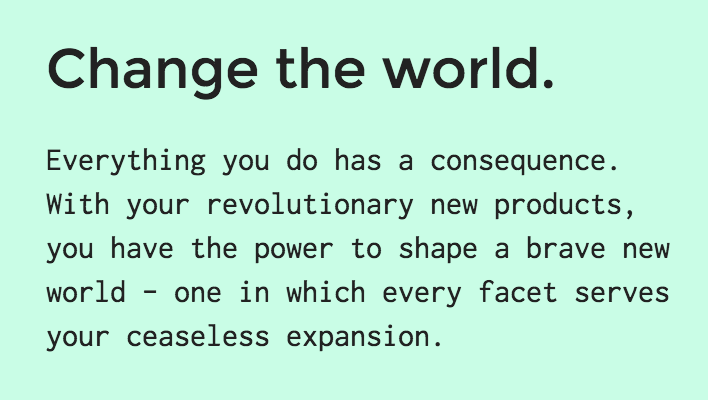Beau Gunderson’s $10 Patreon reward prompt was, “How does living in a cyberpunk world affect our self-determination?” So first let’s talk about regular ol’ self-determination. There are a couple ways to interpret this: sovereign or individual.
The poli-sci version of self-determination is that the citizens of a country get to choose their own mode of government and get to define their constitution. Wikipedia says, this “cardinal principle in modern international law […] states that nations, based on respect for the principle of equal rights and fair equality of opportunity, have the right to freely choose their sovereignty and international political status with no interference.”
The individual form of self-determination is a similar idea, but scaled down — the right and ability to direct your own life. If you examine this closely it’s an obvious illusion, but because free will doesn’t feel like an illusion, we pretend that it exists. I am the master of my fate! It’s a more practical attitude.
Sovereign Self-Determination
Europe and the United States are seeing a split in public sentiment between corporate elite globalism and protectionist plebeian nationalism. I frankly don’t know how this is playing out in South America, Asia, Africa, Australia, etc, etc — but whither goes the USA, the rest of the world tends to follow.
I’d bet on the elite winning over time, and thus the power of governments relative to giant transnational companies weakening and weakening. I mean, hey, at least Cthulhu swims left. But that might take a while, so perhaps global warming will force a sea change first? (Pun very intended.)
The internet is a globalizing force, and it’s so economically compelling that no country or group of people can resist it forever. The winner-take-all dynamics of internet businesses help create new hegemonies that transcend borders. I do want to note that there is significant upside! But upside is not my beat 😉
Personal Self-Determination
I said we pretend to have free will, so even though I don’t believe it exists in a philosophical sense, I’m just going to use conventional language.
Does a cyberpunk world erode the choices available to you? The internet substantially empowers huge companies (think Google, and Facebook) but it also substantially empowers individuals.
You can talk to (almost) anyone, broadcast whatever you want (unless it’s child porn, but I’m okay with that restriction), and sell just about anything anonymously (provided a certain level of opsec prowess — unfortunately this one does apply to child porn). Those caveats don’t negate that more opportunities are available than ever before.
I do worry that I’m over-indexing on my own reality. I have lots of cultural capital, a middle-class safety net, and live in the a place full of jobs. Elsewhere in my country and probably yours as well, there’s a demographic that is saturated with despair.
Opportunities are available. Being equipped to take the opportunities is another thing, yeah?
Header photo by Roel Hemkes.











